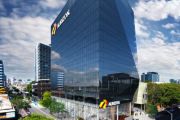
Vicinity sold Chatswood Chase stake for $562m, buys it back for $307m
Shopping mall landlord Vicinity Centres has bought back the remaining half of Sydney mall Chatswood Chase for $307 million, at a hefty 45 per cent discount to the price it traded that stake on to Singaporean sovereign wealth giant GIC six years ago.
The $307 million price tag for the 49 per cent stake also represents a 6.5 per cent discount to the value of the 51 per cent stake that ASX-listed Vicinity had marked in its June accounts for the shopping centre 8 kilometres north of the CBD.

At first blush, the deal pricing neatly tracks the correction that has moved through the retail property sector, well ahead of other commercial property areas such as office. But those discounts also show the correction may be close to the bottom, giving confidence to big players they can invest further in major holdings.
“Premium retail assets such as Chatswood Chase are a key pillar of our strategy and are an important enabler of resilient income growth and sustained value accretion through cycles,” Vicinity chief executive Peter Huddle said on Tuesday.
Vicinity, whose largest shareholder is Rich Lister John Gandel, the direct co-owner of its largest mall, Chadstone in Melbourne’s south-east, already has plans under way for a $620 million upmarket makeover at Chatswood Chase. That project would boost the lower ground dining and fresh food courts while adding a rooftop “office village”.
“Chatswood Chase is an iconic asset with strong growth potential. Our redevelopment plans represent one of the most exciting and transformational projects to be undertaken in Australian retail property today and for the foreseeable future and will reinforce this exceptional asset as northern Sydney’s premier retail destination,” Mr Huddle said.
Vicinity is funding investment in its north shore mall through debt and the sale of some smaller assets, such as the 50 per cent stake in a Melbourne mall it sold for $134.5 million in June. On Tuesday, it also said it had divested Roxburgh Village in Victoria to JY Group for $123 million, a deal brokered by CBRE. Both those transactions were sold at premiums to their book value.
Citi analysts noted that Vicinity had retained the right to nominate another purchaser for the second stake in Chatswood Chase and might well look to engage an institutional investor at some point during the redevelopment.
“We see the transaction as a positive recycling out of lower growth mature assets into higher growth core retail developments at Vicinity’s Chatswood Chase asset,” Citi analysts wrote.
Vicinity’s pre-existing 51 per cent stake in Chatswood Chase was valued at $341.7 million in its June accounts, on a 5.5 per cent yield. Six years ago, Vicinity had struck a $1.1 billion asset swap deal with Singapore’s GIC as it looked to Amazon-proof its portfolio.
Under that 2017 transaction, Vicinity traded over the 49 per cent stake in Chatswood Chase, valued at $562.3 million, to GIC, while taking a 50 per cent stake in three of Sydney’s most prized inner-city retail destinations: the Queen Victoria Building, The Galeries and The Strand Arcade.
Vicinity’s moves are a rare sign of activity amid a broader chill that has swept across the commercial property sector. Deal-making fell to its lowest level for a third quarter in more than a decade, MSCI figures showed this week.
The lack of price discovery has thwarted activity broadly, with buyers and sellers holding back as they await certainty on the effect of rising rates on valuations.
Deal volume totalled just $8.2 billion in the third quarter, down 64 per cent relative to a year earlier, according to the Australia Capital Trends report his week from MSCI Real Assets.
Year-to-date, volume was $27.8 billion, a decline of 55 per cent, with the office sector faring the worst.
“Pricing is of course the major obstacle for deal flow this year, especially as Australia has not seen the same corrections as some overseas markets,” Benjamin Martin-Henry, head of Pacific real assets research at MSCI, said.
“However, prices have adjusted overseas and deal flow is still muted compared to last year, so prevailing economic and geopolitical issues are also having a significant impact on investor confidence.”
Sales of retail assets tumbled 51 per cent in the third quarter relative to a year earlier, with total activity for the year to date down at a similar rate of change. Inflation and rising interest rates have done no favours to consumer spending and, in consequence, to discretionary retail, MSCI noted.










